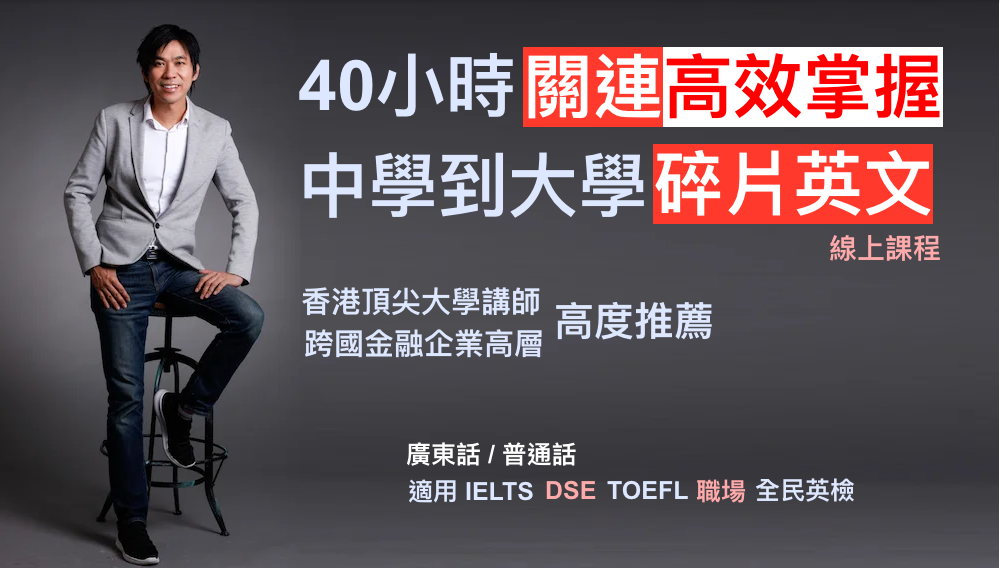DSE英文5**/IELTS 8分的寫作/得體商業行政文件,需要的具體元素
其實DSE 5**/IELTS 8分或以上的 writing,基本上就算native foreigners寫文都不一定隨便能拿到這個分數。以下這些元素,不單能加強你DSE/IELTS Writing能衝頂,也能夠幫你寫出一篇「得體的」論文、行政書信等商業文件。
讓我們先看看IELTS 8/DSE 5** Writing的4項要求:
1. Presents, highlights and illustrates key features/ bullet points sufficiently;
2. Uses paragraphing sufficiently and manages all aspects of cohesion well;
3. Uses a wide range of vocabulary with sophisticated control of lexical features;
4. Uses an accurate range of structure with full flexibility.
根據我多年改文與接觸範文的經驗,「能衝頂」的文章不單是能寫出準確的(Accurate)語法、內容得體、用詞多變恰當(lexical control) 外,以下6點「語法特徵」(Structure with full flexibility and sophisticated cohesion)都是「衝頂文」中經常出現的:
1. Of which/whom +prep which/whom 的表達方式;
2. Adjective collocation /phrasal verb 的prep 處理得宜;
3. 運用Formal subject/Object 將一句句型作「適切的」變化;
4. 運用Inversion 作adj./adv. 組合的強調;
5. 運用Subjunctive Mood 來表達「條件」 ;
6. Tenses 多變的「恰當」應用。
而且,這些語法特徵其實係可以針對式訓練的。
待我逐個舉例吧!
1. Of which/whom +prep which/whom 的4種高階寫作法
以下是其中一個寫作例子:
Physical education is a subject with less homework. Its lesson time is a precious moment to develop friendship among classmates. 這兩句平平無奇
Physical education is a subject with less homework and the lesson time of which is a precious moment to develop comradeship among classmates.
將friendship改成comradeship (患難與共的友情) 會表達出你額外lexical control能力,用the…of which也將你structure with full flexibility and sophisticated cohesion的能力展現出來。
Of/prep + which其實還有另外3種寫法,這個grammatical structure簡直是【高階必學】!
2. Adjective collocation /phrasal verb 的prep 處理得宜
Collocation(配置語/相關語) 總共分兩種: Adjective Collocation和Phrasal Verb,兩者都有preposition的存在。對一個marker來說,發現考生能在短短幾百字中,能使用collocation,並且懂有技術的處理prep. ,絕對是印象分大加的。
舉例:
Could you quote the source you are deprived (來源於)?
其實這句「來源於」的adjective collocation是be deprived from,將相關prep :from不表達,在Spoken English係可以接受的;但在Written English,相關的prep是需要顯示出來的,以顯出你的寫作功架。
應寫成: Could you quote the source you are deprived from? 或
Could you quote the source which you are deprived from?
不過我更會這樣寫: Could you quote the source from which you are deprived? 將from搬上which前面,顯示出preposition處理得宜的能力。
要preposition處理得當,有足夠的pool of Adjective collocation及pool of phrasal verb係好重要。我建議至少各記100組。
【按此: 7+3視覺英語AE版: 內含各100組Adjective collocation及Phrasal verb】
3. 運用Formal Subject/Object 將一句句型作「適切的」變化;
善用’it’ 這個「虛」字(Formal Subject/Object之技術 )。會帶來不少句型的深層變化。
例如:
The Dutch have already demonstrated living below sea level to be feasible. (荷蘭人已証明在水平線下生活是可行的。) 這句的Object太臃腫。可以運用一個’it’ 做formal object,將真Object放在後面。
The Dutch have already demonstrated it feasible living below sea level.
‘It’ 在這裡是一個虛字,我想不少同學在Reading都見過外國文章常出現這種Formal Subject/Object的例子。 如果你在文章用到,絕對係其中一個「給高Grade的一個訊號」。
4.運用Inversion 作adj./adv. 組合的強調
對英語寫作不錯的人來說,適當運用Inversion技術是衝頂必備的。(這是雙刃劍,如果你的寫作語法一向都麻麻,那就無必要運用了,可能弄巧反拙,被marker認為你在背stock phrases) 。
舉例:
They broke into her Dad’s room and found the man lying on the floor.( 講人) A silver snake(講物) was around his neck (講回人). 這是較平平無奇的叙述。
可以考慮將around his neck這adv.組合放前,那Cohesion會更sophisticated—先詳細交代人,再講出物;而非講了人,又講物,又講回人。
改成:
They broke into her Dad’s room and found the man lying on the floor. Around his neck was a silver snake! 這些就正是衝頂要求的structure with full flexibility and sophisticated cohesion了!
Inversion其實好總共有4款,可以將句子變來變去,好好玩的,可謂博大精深。如果想在高層商業行政書信上「見得下人」/或者想用英文寫篇好的論文,其實係必學的。
5. 運用Subjunctive Mood 來表達「條件」 ;
條件If…then的關係,其實可以加一點mood進去。這個Mood叫做Subjunctive Mood(虛擬語氣)。
舉例:
If the weather is fine, we will go on a hike. 真係好平庸。可以改成Improbable的Subjunctive Mood(如果真係Improbable–不看好) 的話:
Suppose it be fine, we will go on a hike. 係咪完全唔同感覺呢!
6. Tenses 多變的「恰當」應用。
很多同學們學了很多年Tenses,都是停留在「見到什麼adv.of time,就用什麼tense」或是「用了過去式的話,就繼續用過去式」的初階思維。其實這種思維在初階英語運用時是可以的,但是去到高中程度或以上,這種思維模式是有必要戒除的。如果不戒除,在應用Tenses必定係盲點處處。
我是7+3視覺英語的講師Tomato Yip,幫助過數以千計的考生重建「英語思維」及重燃學習英語的興趣:英語世界100%句子都能用7條句型公式+3種語法顏色所【畫解】,不單有趣、易明、且明顯能發展出學生「舉一反三」的語法能力。如大家想對以上6種語法技術有更深層的提升,歡迎上我們的【按此:7+3視覺英語AE版:高級語法與Tenses大全】,這課程可以將你的「英語思維系統」,提高多一個維度。


